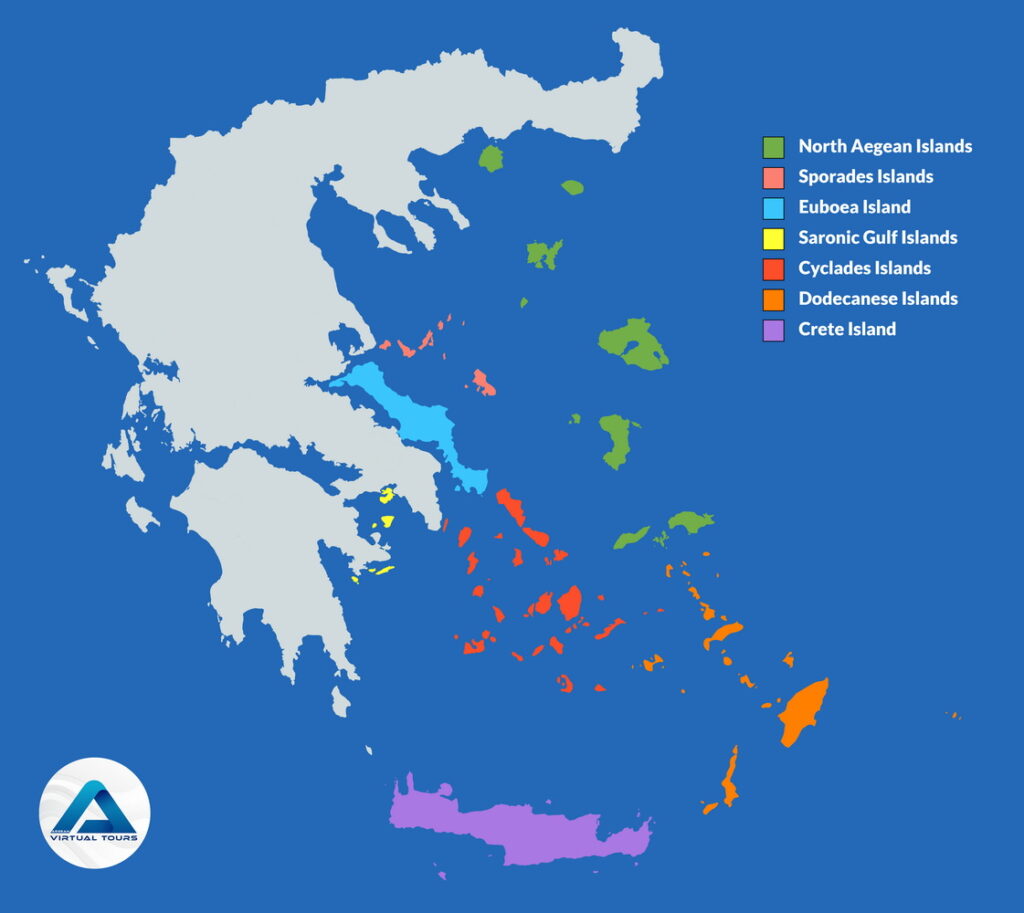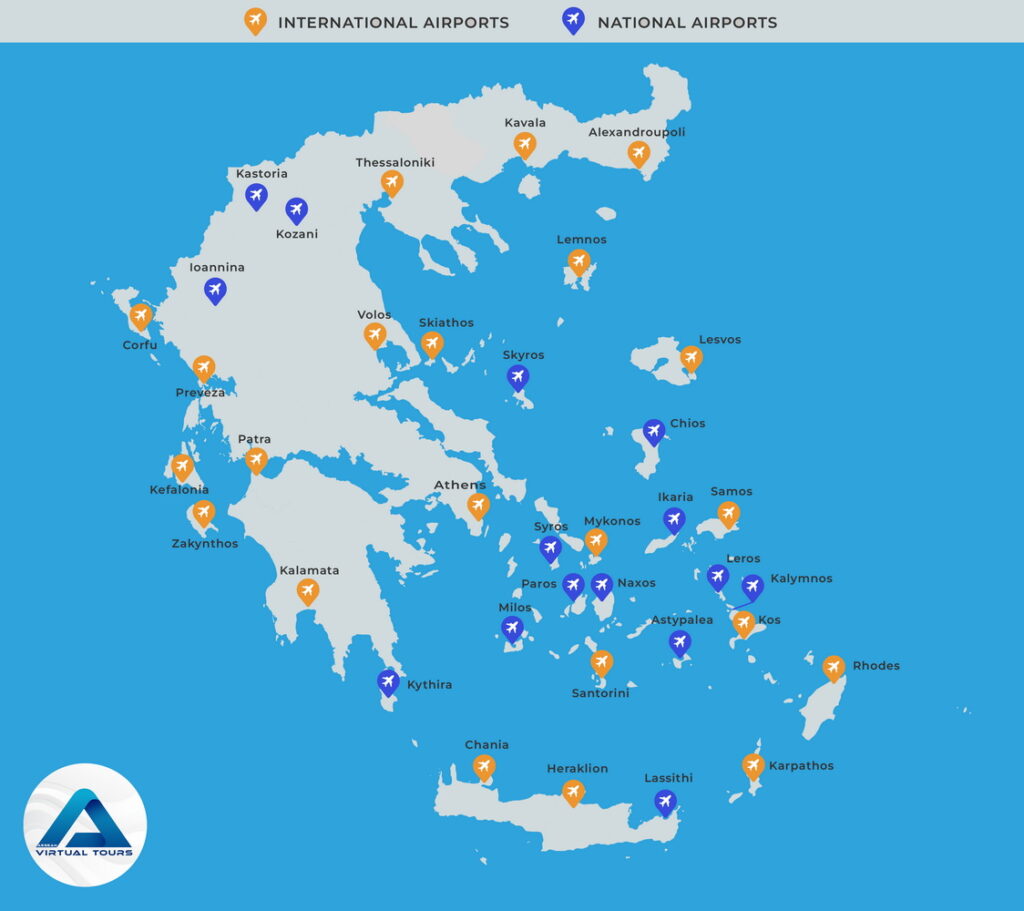The wildly beautiful and wonderfully diverse Aegean Islands are a true dream holiday destination. Whether you are looking for a romantic getaway, a family vacation, or a solo adventure, the rich culture and breathtaking landscapes of this Mediterranean paradise offer something for everyone.
Spectacular scenery, amazing beaches, wonderful weather, friendly people, traditional villages, and seaside restaurants serving delicious cuisine. In three words: the Aegean islands!
How the Aegean Sea got its name
Those who have read about the mythical Trojan War or studied their Bibles may have come across the Aegean Sea. However, the Aegean Sea itself is not a myth, but an extension of the Mediterranean Sea, beautifully situated between mainland Greece and Turkey.
There is controversy over the origins of the name “Aegean” in Greek mythology and etymology. Legend has it that it was named after Aigeas, the king of Athens, who threw himself off a cliff into the water after mistakenly thinking his son Theseus had been killed by the Minotaur, a man with the head of a bull.
According to another explanation, the name comes from the Greek word ’aiges’, meaning ‘high waves’, and ‘aigaios’, meaning ‘great sea’.
Morphology
The islands are the main characteristic of Greek morphology and an integral part of the country’s culture throughout the centuries.
The Aegean Sea takes up 7,500 km of the country’s total coastline and offers a highly diversified landscape: sheltered bays, golden sandy beaches with dunes, coastal caves with steep cliffs, and black sand typical for volcanic soils.
Many Aegean beaches have been awarded the Blue Flag under the Blue Flags of Europe program for clean beaches. They are suitable not only for swimming, but also for diving, snorkeling, water skiing, sailing, and windsurfing.
The Aegean Sea is the cradle of some of the oldest and most flourishing European cultures, such as the Cycladic and Minoan civilizations. The islands have unique archeological sites, an outstanding architectural heritage, and centuries of fascinating local traditions from a multi-layered cultural past.
Aegean Islands
There are over 1,400 islands in the Aegean Sea of varying size and nature, but less than 100 of them are inhabited. The islands are divided into seven major island groups. Strictly speaking, there are six main island groups plus Euboea and Crete.
The main Greek island groups are:
- the islands of the North Aegean — the most important islands being Lesbos, Chios, Samos, Lemnos, Thassos, Ikaria
- the islands of the Sporades — the most important islands being Skiathos, Skopelos, Skyros and Alonissos
- the islands of the Saronic Gulf — the most important islands being Salamis, Aegina, Poros, Spetses, Hydra and Agistri
- the Cyclades — the main islands of which are Syros, Naxos, Santorini, Paros, Andros, Mykonos, Tinos and Milos
- the Dodecanese complex — the main islands being Rhodes, Kos, Kalymnos, Leros, Karpathos, Patmos, Symi, Astypalea, Kassos and Nisyros.
Aegean Islands
There are over 1,400 islands in the Aegean Sea of varying size and nature, but less than 100 of them are inhabited. The islands are divided into seven major island groups. Strictly speaking, there are six main island groups plus Euboea and Crete.
The main Greek island groups are:
- the islands of the North Aegean — the most important islands being Lesbos, Chios, Samos, Lemnos, Thassos, Ikaria
- the islands of the Sporades — the most important islands being Skiathos, Skopelos, Skyros and Alonissos
- the islands of the Saronic Gulf — the most important islands being Salamis, Aegina, Poros, Spetses, Hydra and Agistri
- the Cyclades — the main islands of which are Syros, Naxos, Santorini, Paros, Andros, Mykonos, Tinos and Milos
- the Dodecanese complex — the main islands being Rhodes, Kos, Kalymnos, Leros, Karpathos, Patmos, Symi, Astypalea, Kassos and Nisyros.
When is the best time to visit the Aegean islands?
No matter what time of the year you choose to travel to the Aegean Sea, you’re sure to find unique festivals, plenty of outdoor activities, and beautiful scenery. However, it’s important to be aware of what to expect in terms of weather so you know what to pack for your vacation.
The Aegean climate is defined as hot-summer-Mediterranean, characterized by dry and hot summers and wet and mild winters. Greece is mostly sunny all year round.
The months of May, June, and September are great for visiting the Aegean islands if you are looking for pleasant weather but wish to avoid the crowds.
During the high season (mid-June to mid-September) there are more ferry services and flight options available. This is also the time when most restaurants and beach bars are open. On the other hand, there are more tourists, and the prices are higher as well.
Each island group has its own weather conditions; Crete is the warmest all year round, making it a good choice for late fall or winter. And while some islands, like Hydra, are full of locals and accommodate tourists during the winter months, others, like Santorini, are very quiet during the low season (November to March).
Is Greece safe to visit?
Greece is a very safe country to visit. Ranked 39th on the world’s safest countries list, it is very open and safe for travelers.
Violent crimes are unlikely to happen, especially to tourists. Pickpocketing and bag snatching are the most common problems in Greece, especially near tourist attractions and in crowded places, so it is recommended to either store most of your money at the hotel or carry it safely near your body so that it cannot be stolen.
Never carry all of your money in one place. Even though petty crime is common, violent crime is very unlikely to occur.
Greek hospitality
Hospitality in Greece dates back thousands of years, to ancient Greece. Xenia / Philoxenia (meaning “guest-friendship”) is the ancient Greek concept of hospitality, the generosity and courtesy shown to those who are far from home and need a place to rest. For modern Greeks, showing generosity and courtesy to strangers is an unspoken cultural law.
Philoxenia can be as simple as smiling, helping a stranded traveler, or opening your home to strangers, friends, and family. There are countless articles and stories describing the hospitality of Greek people, in Greece and outside of Greece.
Greeks are excellent and generous hosts, and their hospitality might even feel overwhelming to non-Greeks. Hugging and kissing in public are very common. Greeks usually greet each other (men and women alike) by embracing and kissing each other on both cheeks. Overall, Greeks are very demonstrative and affectionate.
They love it when foreigners are interested in speaking Greek — even just a few words. Try speaking a few Greek words or joining in Greek dances, and your Greek hosts will be overjoyed!
Greeks are very verbose and intense in their conversations. They tend to have lengthy, argumentative, and intense discussions. Non-Greeks might think that they are rambling on forever, and arguing about everything just for the sake of it.
Greek Cuisine
Greek cuisine is ranked second among the fifty best cuisines in the world, with Italy taking first place and Spain in third, according to a list published by the World TasteAtlas (2022). Greeks are known to love food, love to eat, and love to offer food to others. In Greece, you are guaranteed to never feel hungry.
The Greek countryside is fertile ground for a variety of fruits and vegetables, making its cuisine a colorful tapestry of flavors. With a 4,000-year-old culinary tradition, Greek cuisine is full of flavor and the meals are prepared mainly with fresh local ingredients, seasonal fruits, vegetables, olive oil, cheese, meat, fish and grains.
Useful Information
Visas — Visas for Greece are usually not required for any stays lasting less than 90 days, and EU residents can stay in the country for as long as they like. Your passport should be valid for at least six months after the date of your return from the country you are visiting. However, if you are not sure about your visa status, visit www.doyouneedvisa.com which will let you know whether or not you need a visa based on your nationality.
Currency — Euro is the official currency in Greece. You can exchange your money in exchange offices and banks all around Greece and use ATMs normally. Greece is relatively affordable compared to other European tourist destinations, so you can count on spending from 60 to 80 euros per day.
Airports — The biggest airport in Greece is the International Airport of Athens, which can be easily reached by bus or metro from the city center. Athens International Airport receives the majority of foreign visitors arriving in Greece; from there, most of them catch a connecting flight to travel to the Greek islands by plane, or get to one of the ports in Athens in order to travel to the islands by ferry.
Travel Insurance — Just like anywhere else, we recommend getting travel insurance when traveling to Greece. Not only does it cover the costs in case of medical problems, but also theft and loss of valuables.




